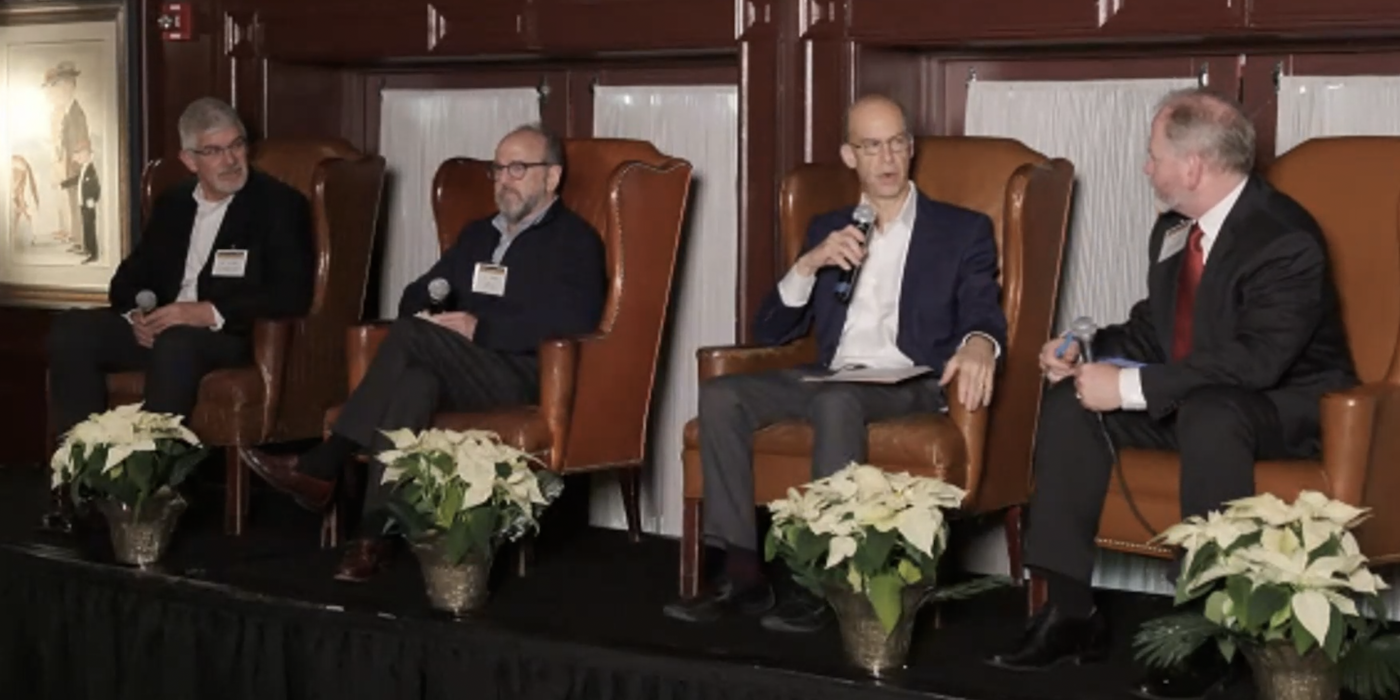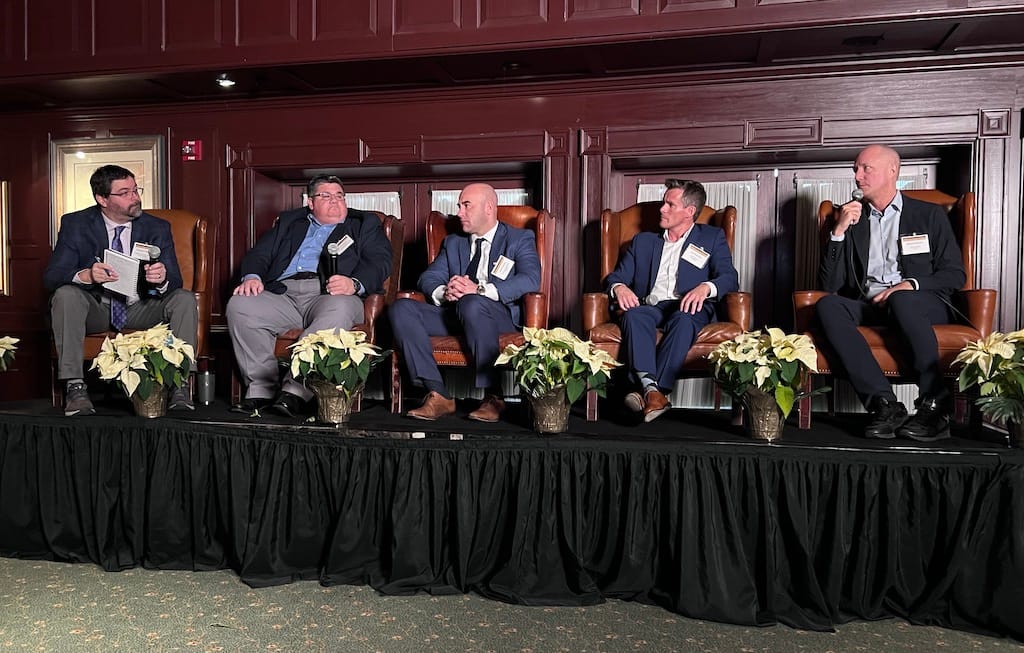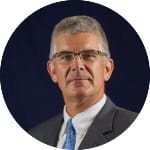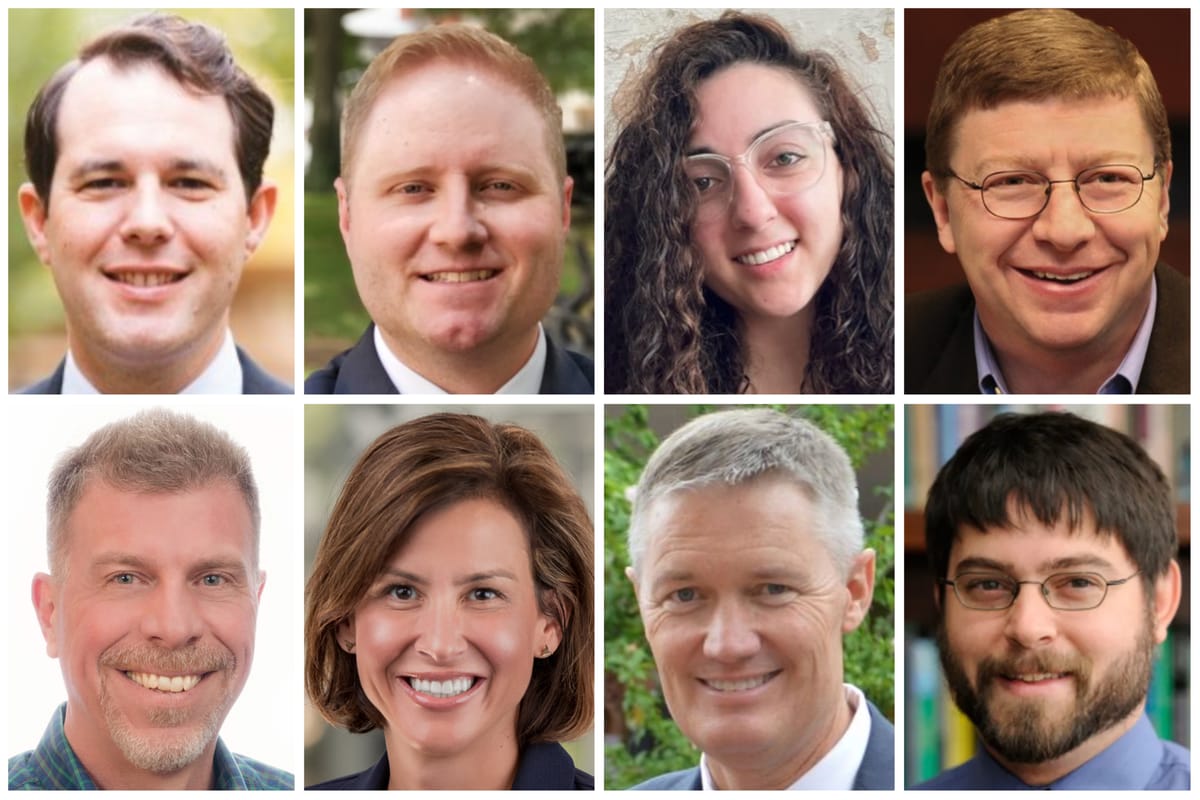
Digital Infrastructure Investment 2023
A summit uniting financial services and broadband operators
Become a Breakfast Club MemberFull Program, Speaker Bios and Sponsors
In person or online attendees may access the videos. Members of the Broadband Breakfast Club also have full access.
Digital Infrastructure Investment 2024 is 'All-in' on Open Access
See the program and Sign up
Sign up for DII 2024Video page for Digital Infrastructure Investment 2023

Digital Infrastructure Investment Program
Tuesday, December 5, 2023
PANEL 1: INVESTMENT IN AND BEYOND BEAD
Broadband infrastructure expansion hinges on the availability of sufficient funding, be it from federal, state, local, or private channels. Beyond the hundreds of millions (and frequently billions) of dollars earmarked for each state under the Broadband Equity, Access and Deployment program, internet service providers must also obtain at least 25% of the project’s cost in matching funds. Where will this funding come from? What implications does this requirement hold for smaller and municipal providers? And, for those ISPs not interested in BEAD, what financing opportunities are available now that weren’t there previously?
• Kenrick (Rick) Gordon, Director, Maryland Office of Statewide Broadband
• Thomas Tyler, Deputy Director, Connect Louisiana
• Brian Vo, Chief Investment Officer at Connect Humanity
• Maria Curi (moderator), Reporter, Axios

PANEL 2: SHARED INFRASTRUCTURE AND THE FUTURE OF VERTICAL REAL ESTATE
Urbanization and smart city deployments are among the trends driving the transformation of shared infrastructure. The post-pandemic surge in remote work and the nationwide push for universal and affordable high-speed internet access, generally through fiber, raises an important question: What’s next for “vertical infrastructure”? How is wireless infrastructure being capitalized? How is wireless infrastructure connected to fiber builds? Are small-cell deployments proceeding vigorously? And what role will “managed services” within multiple dwelling units, commercial and enterprise environments play in driving smart and hybrid networks?
• Jonathan Adelstein, Managing Director and Head of Global Policy and Public Investment at DigitalBridge Investment Management
• David E. Bronston, Special Counsel, Phillips Lytle LLP
• Greg McLaughlin, CEO, AEX Automation Exchange
• Drew Clark (moderator), Editor and Publisher, Broadband Breakfast

KEYNOTE ADDESS: THE PAST AND FUTURE OF OPEN ACCESS
- Mikael Philipsson, CEO, COS Systems

PANEL 3: DEVELOPMENTS IN OPEN ACCESS: IS CHANGE IN THE OFFING?
The United States is still early in its experimentation with open access networks. But countries including Sweden have seen widespread success in implementing this model. Open access networks aim to deliver affordable and high-speed internet even to remote, low-return areas. But various policy and operational challenges are often needed before this model can see the fullest adoption. With an array of new market developments in the United States from both incumbents, scrappy equity-based investors and municipalities, does the future for open access on these shores look brighter?
• Scott Bradshaw, President, SiFi Networks
• Robert Bridgham, Executive Director, Eastern Shore of Virginia Broadband Authority
• Jeff Reiman, President, The Broadband Group
• Christopher Mitchell (moderator), Director of the Community Broadband Networks Initiative, Institute for Local Self-Reliance

PANEL 4: INTERNET EXCHANGE POINTS AND THE NEXT STEP FOR DATA CENTERS
Substantial investments are directed by the BEAD program toward last-mile fiber infrastructure. Middle mile, backhaul access and data centers almost seem left out of the current conversation. Despite this lower profile, ISPs seeking to deploy better broadband understand all too well the significance of internet exchange points that facilitate the exchange of data between various networks. They are vital to reducing latency and lowering costs. Notably, 14 U.S. states and 3 territories currently lack IXPs. What obstacles do IXPs face? How will more IXPs facilitate the data center and cloud computing revolutions? What’s next for IXPs and data centers?
• Scott K. Brown, President, The Pixel Factory
• Tom Cox, Vice President of State Government Affairs, Connected Nation
• Ron da Silva, Network Technologies Global, Saras Partner
• Ben Hedges, Vice President Network Strategy, Cyxtera
• Peter Cohen (moderator), Principal Program Manager, Microsoft

Video page:

Digital Infrastructure Investment Speaker Bios
PANEL 1: INVESTMENT IN AND BEYOND BEAD

Kenrick (Rick) Gordon
Kenrick (Rick) Gordon, P.E. has over 30 years of engineering design and construction administration experience. As the Director of Maryland’s Office of Statewide Broadband at the Maryland Department of Housing and Community Development (DHCD), Rick oversees digital inclusion efforts and the expansion of broadband capabilities statewide to ensure broadband access is available to all unserved households and businesses in Maryland. He works with agencies across county, state and the federal government and with independent provider stakeholders to establish and enact programs to provide statewide access to high-speed internet. Prior to his position at DHCD, he served as the Director of the Governor’s Office of Rural Broadband.

Thomas Tyler
Thomas Tyler has experience in technology strategy, cybersecurity affairs, economic development, and public policy disciplines. As the Deputy Director for Louisiana’s Office of Broadband Development and Connectivity, he has served an instrumental role in standing up key initiatives and leads numerous functions ranging from policy and government relations to strategic planning and grant program administration. Previously, Thomas served both in the public and private sectors, leading Louisiana Economic Development’s Digital Interactive Media and Software Development Incentive Program.

Brian Vo
Brian Vo is the Chief Investment Officer at Connect Humanity, an impact fund investing in broadband infrastructure targeting low-income, rural, and BIPOC communities. Connect Humanity provides structured loans to ISPs, municipalities, co-ops, and others building and operating affordable broadband. Prior to impact investing, Brian was with McKinsey & Company's Strategy and Corporate Finance Practice, Macquarie's Private Equity team, and Jefferies Investment Bank.

Maria Curi
Maria Curi is a tech policy reporter at Axios and author of the Axios Pro: Tech Policy newsletter. She covers tech from Capitol Hill, including AI, industrial policy and telecom. Previously, she was at Bloomberg Government.
PANEL 2: SHARED INFRASTRUCTURE AND THE FUTURE OF VERTICAL REAL ESTATE

Jonathan Adelstein
Jonathan S. Adelstein is a Managing Director and Head of Global Policy and Public Investment at DigitalBridge Investment Management. He works with all DigitalBridge portfolio companies on public policy and strategic regulatory matters and reviews policy impacts on potential investments. Prior to joining DigitalBridge, Adelstein was President and CEO of the Wireless Infrastructure Association, representing more than 200 businesses that build, own, and operate wireless infrastructure. Prior to WIA, Adelstein was nominated to positions by both President Barack Obama and President George W. Bush and confirmed unanimously for each by the U.S. Senate. Under Obama, Adelstein headed the U.S. Department of Agriculture’s Rural Utilities Service as Administrator, leading the investment of nearly $7 billion under the Recovery Act in rural broadband and water infrastructure and oversaw a $60 billion loan portfolio in rural electric, telecommunications, and water infrastructure. Adelstein was nominated by Bush and served as Commissioner of the Federal Communications Commission from 2002 to 2009. He also served in the U.S. Senate as a senior policy advisor to the Senate Majority Leader.

David Bronston
David Bronston, former general counsel for the NYC Department of Information Technology and Telecommunications, is an authority on fiber and wireless network deployment in public and private rights of way. Bronston has obtained and negotiated licensees, franchise leases and authorizations necessary for digital infrastructure deployments of towers, small cells, Distributed Antenna Systems, data centers, metro enterprise and middle mile networks. A builder of both telecommunications and professional networks, Bronston and Phillips Lytle can assist with public private partnership and joint venture agreements, financing transactions and network build agreements. In other words, the regulatory, operational and transactional elements of successful network deployments.

Greg McLaughlin
Greg McLaughlin, the CEO of AEX | Automation Exchange, boasts a robust background in US telecom and an impressive range of expertise encompassing operations, technology, and strategy. Throughout his illustrious career, McLaughlin has held pivotal positions, including serving as the Senior Director of Operations for Charter Communications' Wireless Engineering Group. In this capacity, he played a crucial role in driving advanced wireless deployment initiatives and shaping Charter's positions on spectrum and technology policy. Moreover, his previous tenure as the Director of Corporate Strategy for Bright House Networks, along with being a key member of the SpectrumCo and Cable WiFi wireless consortiums, adds to his extensive operational roles spanning over twenty-three years in the broadband industry. McLaughlin now leads AEX’s entry into the US broadband market. With a decade of success in South Africa, AEX moved its operations to Charlotte, North Carolina—offering the first and only tested and proven integrated OSS/BSS platform built by network operators for network operators.

Drew Clark
Breakfast Media LLC CEO Drew Clark has led the Broadband Breakfast community since 2008. An early proponent of better broadband, better lives, he initially founded the Broadband Census crowdsourcing campaign for broadband data. As Editor and Publisher, Clark presides over the leading media company advocating for higher-capacity internet everywhere through topical, timely and intelligent coverage. Clark also served as head of the Partnership for a Connected Illinois, a state broadband initiative.
KEYNOTE

Mikael Philipsson
Mikael Philipsson is CEO of COS Systems, a BSS/OSS software provider for broadband operators to enable zero touch automation and Open Access. He has extensive experience in fiber infrastructure rollouts as he for 18 years had leading roles as CTO, Sales director and CEO when developing IP-Only, a fiber infrastructure operator in the Nordics. From 2013 under ownership of EQT he led a large FTTH rollout to millions of homes challenging the legacy large telecom operators. The initiative kicked off the fiberrace in Sweden, and now, 10 years later 98% of all homes and businesses have access to fiber (1/1 Gbit/s) and the broadband operator landscape looks very different compared to before the fiberrace started. Mikael moved to the US in august to lead the expansion of COS in US/Canada.
PANEL 3: DEVELOPMENTS IN OPEN ACCESS: IS CHANGE IN THE OFFING?

Scott Bradshaw
Scott Bradshaw is President of SiFi Networks, which funds, builds and owns FiberCity™ networks for use by Internet Service Providers, 4G/5G carriers and other service providers. SiFi Networks is for all wishing to deliver ubiquitous high-speed broadband services to business and residential properties as well as connectivity for city-wide Internet of Things applications. Bradshaw has also helped lead entities to create and deliver P3 investment models, IP licensing and channel partnerships throughout emerging markets in North America, Europe and Middle East.

Robert Bridgham
Robert Bridgham has held a number of senior management positions over the past 25-years providing technical, administrative, and executive leadership. As Executive Director of the Eastern Shore of Virginia Broadband Authority(ESVBA), Robert is responsible for all facets of the organization including operations, engineering, construction, finance, procurement, sales and service. Robert was the senior technical designer of the ESVBA and has been directly responsible for the organizations budgeting, personnel, deployment, political impacts and development of all relationships for joint projects. Being experienced in both private and public sectors has enabled Robert has a diverse set of skills to address the needs of both private industry as well as the knowledge to address the public interest. Prior to the ESVBA, Robert served as Senior Vice President of Engineering for Cornerstone Telephone designing, engineering, implementing and operating a multi-state network.

Jeff Reiman
As President of The Broadband Group, Jeff Reiman leads both the The Broadband Group and TBG Network Services in representing cities, electric utilities, and developers of large- scale master planned communities to identify achievable wired and wireless broadband deployment strategies. Over the past 25+ years, TBG’s influence, and planning expertise has been instrumental in the creation of industry-shaping fiber broadband deployments and Technology Master Plans in markets throughout the nation.

Christopher Mitchell
Christopher Mitchell is the Director of the Community Broadband Networks Initiative with the Institute for Local Self-Reliance in Minneapolis. Mitchell, a leading national expert on community networks, Internet access, and local broadband policies, built MuniNetworks.org, the comprehensive online clearinghouse of information about local government policies to improve Internet access. Its interactive community broadband network map tracks more than 600 such networks.
PANEL 4: INTERNET EXCHANGE POINTS AND THE NEXT STEP FOR DATA CENTERS

Scott K. Brown
In 2014 Scott K. Brown was one of the founding members in the creation of the Richmond Virginia Internet Exchange, the first IX outside of Ashburn in the Virginia region. Providing a neutral location for networks and content providers to connect. RVA-IX was acquired in 2019 by the world’s leading internet Exchange Deutsche Commercial Internet Exchange, or DE-CIX, which continues its operation of RVA-IX three locations in Richmond: Pixel Factory, QTS and Edgeconnex data centers. After the sale of RVA-IX, Scott continues the day to day operations of the data center.

Tom Cox
Tom Cox is the Vice-President of State Government Affairs at Connected Nation and works directly on their IXP initiative. A Kansas native, Tom served 4-years in the Kansas House of Representatives and was known for his work advocating for broadband and telecommunications policy during that time. Before Tom’s time in office he was the Vice President at one of the 25 largest self-storage portfolios in the U.S., managing operations, revenue management, technology and marketing initiatives.

Ron da Silva
Ron da Silva is an NACD certified Board Director with extensive corporate and internet governance experience. He serves on the Boards of Chartway and CertifiedTrue, is a Communications Commissioner for Loudoun County, Virginia, maintains a consulting practice, Network Technologies Global and is an advisor with Saras Partners. Previously, Ron was Board member of ICANN, Board Member of the Data Center Coalition, Vice President of Operations for Quantum Loophole, Executive Director with Denuo, CIO and Co- Founder of CertifiedTrue, and various leadership and engineering roles with Charter, Time Warner Cable, American Online and Sprint. He holds a Bachelor of Science in applied mathematics and English from Old Dominion University.

Ben Hedges
Ben Hedges has served as a Board Director of the Global Peering Forum since 2015. He was the organization’s President from 2021-2023 and currently serves as Treasurer. Ben is Vice President, Network Strategy at global colocation operator Cyxtera, including IXP expansion and development across their 24 markets. As part of the leadership team at the London Internet Exchange (LINX) from 2010-2019 Ben was responsible for launching multiple regional IXPs to underserved areas of the UK, and the creation of their first International IXP in the USA.

Peter Cohen
Peter Cohen is a highly experienced professional with over 25 years of expertise in the tech industry, and is Principal Program Manager for Microsoft. Throughout his career, he has worked on a wide range of projects related to peering, IP transit, datacenters, CDNs, and subsea cables. He has worked with some of the most prominent companies in the world, including Arelion, Amazon, and Netflix. Currently, Peter resides in the Washington D.C. area.
Videos from Digital Infrastructure Investment 2023:

Digital Infrastructure Investment 2020, 2021, 2022:




Other Broadband Breakfast Events:








